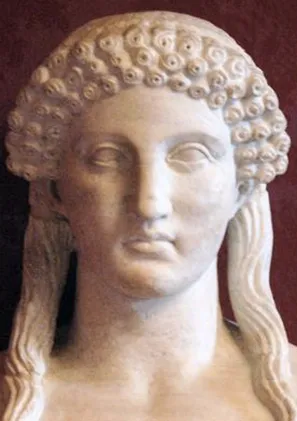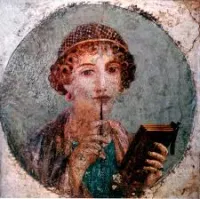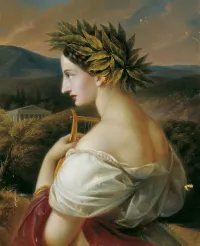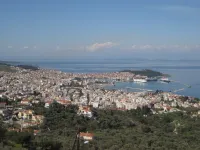Biography
Circa 630 BCE - Circa 570 BCE
“May I write words more naked than flesh, stronger than bone, more resilient than sinew, sensitive than nerve.”
– Sappho
Plato referred to her as “The 10th Muse.” Horace wrote in his Odes that her lyrics are worthy of sacred admiration. Despite living a mere 30 years, Sappho remains one of the greatest poets of ancient Greece and one of the most famous in all European history. Her home was the Greek Island of Lesbos in the Aegean Sea. Though married to a wealthy merchant and having a daughter named Cleis, her words of longing for various female loves have been central to lesbian cultural ethos for centuries. So much so that the island of her birth became the basis for the word lesbian and a variation of her own name is now literary shorthand for female homosexual desire. Sappho inspired young women to cultivate social skills, discuss literature, and to worship Aphrodite, the goddess of love and sexuality. She wrote love poems in tribute to these intense relationships and shared them with both her family and the women of her salon. She was unique in that her poetry was written not in homage to the gods or for political reasons, as was the fashion of the day; rather her work was of a personal nature and is celebrated for its passionate descriptions of emotion and simple lyrical beauty. Of her verse, nine volumes of poetry have been recovered, almost all in mere fragmented form. The tragic loss of so much of her writing is often attributed to the age of the papyrus upon which the words were written; others contend that its homoerotic nature made it subject to purposeful destruction by the Church; whatever the reason, that which survives has moved and inspired people of all backgrounds for millennia.
Circa 630 BCE - Circa 570 BCE
“May I write words more naked than flesh, stronger than bone, more resilient than sinew, sensitive than nerve.”
– Sappho
Plato referred to her as “The 10th Muse.” Horace wrote in his Odes that her lyrics are worthy of sacred admiration. Despite living a mere 30 years, Sappho remains one of the greatest poets of ancient Greece and one of the most famous in all European history. Her home was the Greek Island of Lesbos in the Aegean Sea. Though married to a wealthy merchant and having a daughter named Cleis, her words of longing for various female loves have been central to lesbian cultural ethos for centuries. So much so that the island of her birth became the basis for the word lesbian and a variation of her own name is now literary shorthand for female homosexual desire. Sappho inspired young women to cultivate social skills, discuss literature, and to worship Aphrodite, the goddess of love and sexuality. She wrote love poems in tribute to these intense relationships and shared them with both her family and the women of her salon. She was unique in that her poetry was written not in homage to the gods or for political reasons, as was the fashion of the day; rather her work was of a personal nature and is celebrated for its passionate descriptions of emotion and simple lyrical beauty. Of her verse, nine volumes of poetry have been recovered, almost all in mere fragmented form. The tragic loss of so much of her writing is often attributed to the age of the papyrus upon which the words were written; others contend that its homoerotic nature made it subject to purposeful destruction by the Church; whatever the reason, that which survives has moved and inspired people of all backgrounds for millennia.
Demography
Demography
Gender Female
Sexual Orientation Lesbian
Gender Identity Cisgender
Ethnicity Caucasian/White
Nations Affiliated Greece
Era/Epoch Antiquity/Ancient History (beginning of recorded history-476 CE)
Field(s) of Contribution
Poet
Demography
Gender Female
Sexual Orientation Lesbian
Gender Identity Cisgender
Ethnicity Caucasian/White
Nations Affiliated Greece
Era/Epoch Antiquity/Ancient History (beginning of recorded history-476 CE)
Field(s) of Contribution
Poet
Resources
Resources
Cantarella, Eva. Pandora's Daughters: The Role and Status of Women in Greek and Roman Antiquity. Baltimore: John Hopkins University Press, 1987.
De Jean, Joan. Fictions of Sappho 1546-1937. Chicago: University of Chicago Press, 1989.
Dover, Kenneth J. Greek Homosexuality. Cambridge, Mass.: Harvard University Pres, 1978.
DuBois, Page. Sappho Is Burning. Chicago: University of Chicago Press, 1995.
Grahn, Judy. The Highest Apple: Sappho and the Lesbian Poetic Tradition. San Francisco: Spinsters, Ink, 1985.
Hallett, Judith. "Sappho and Her Social Context." Signs 4 (1979): 447-464.
Lefkowitz, Mary R. "Critical Stereotypes and the Poetry of Sappho." Greek, Roman & Byzantine Studies 14 (1973): 113-123.
Rissman, Leah. Love as War: Homeric Allusion in the Poetry of Sappho. Konigstein: Verlag Anton Hain, 1983.
Snyder, Jane McIntosh. Lesbian Desire in the Lyrics of Sappho. New York: Columbia University Press, 1997.
Snyder, Jane McIntosh. The Woman and the Lyre: Women Writers in Classical Greece and Rome. Carbondale: Southern Illinois University Press, 1989.
Winkler, John J. "Double Consciousness in Sappho's Lyrics." The Constraints of Desire. New York: Routledge, 1990. 162-187.
https://en.wikipedia.org/wiki/Sappho
https://www.thoughtco.com/sappho-of-lesbos-biography-3530337
https://www.newyorker.com/magazine/2015/03/16/girl-interrupted
https://www.poetryfoundation.org/poets/sappho
https://www.theatticoneighth.com/blog/sappho-everyones-favorite-lesbian…
Resources
Cantarella, Eva. Pandora's Daughters: The Role and Status of Women in Greek and Roman Antiquity. Baltimore: John Hopkins University Press, 1987.
De Jean, Joan. Fictions of Sappho 1546-1937. Chicago: University of Chicago Press, 1989.
Dover, Kenneth J. Greek Homosexuality. Cambridge, Mass.: Harvard University Pres, 1978.
DuBois, Page. Sappho Is Burning. Chicago: University of Chicago Press, 1995.
Grahn, Judy. The Highest Apple: Sappho and the Lesbian Poetic Tradition. San Francisco: Spinsters, Ink, 1985.
Hallett, Judith. "Sappho and Her Social Context." Signs 4 (1979): 447-464.
Lefkowitz, Mary R. "Critical Stereotypes and the Poetry of Sappho." Greek, Roman & Byzantine Studies 14 (1973): 113-123.
Rissman, Leah. Love as War: Homeric Allusion in the Poetry of Sappho. Konigstein: Verlag Anton Hain, 1983.
Snyder, Jane McIntosh. Lesbian Desire in the Lyrics of Sappho. New York: Columbia University Press, 1997.
Snyder, Jane McIntosh. The Woman and the Lyre: Women Writers in Classical Greece and Rome. Carbondale: Southern Illinois University Press, 1989.
Winkler, John J. "Double Consciousness in Sappho's Lyrics." The Constraints of Desire. New York: Routledge, 1990. 162-187.
https://en.wikipedia.org/wiki/Sappho
https://www.thoughtco.com/sappho-of-lesbos-biography-3530337
https://www.newyorker.com/magazine/2015/03/16/girl-interrupted
https://www.poetryfoundation.org/poets/sappho
https://www.theatticoneighth.com/blog/sappho-everyones-favorite-lesbian…





